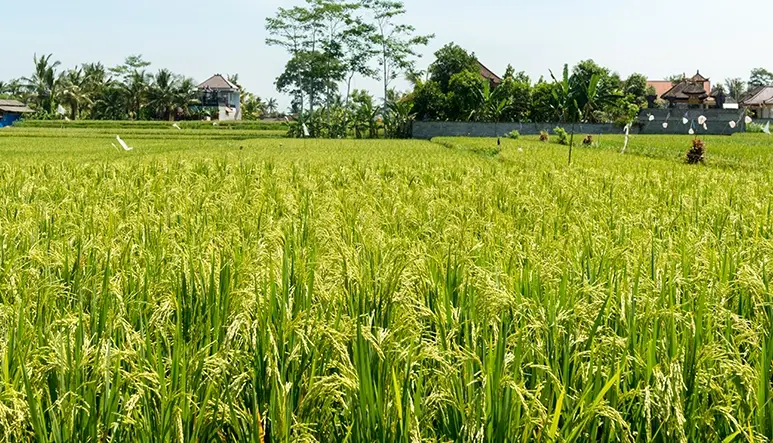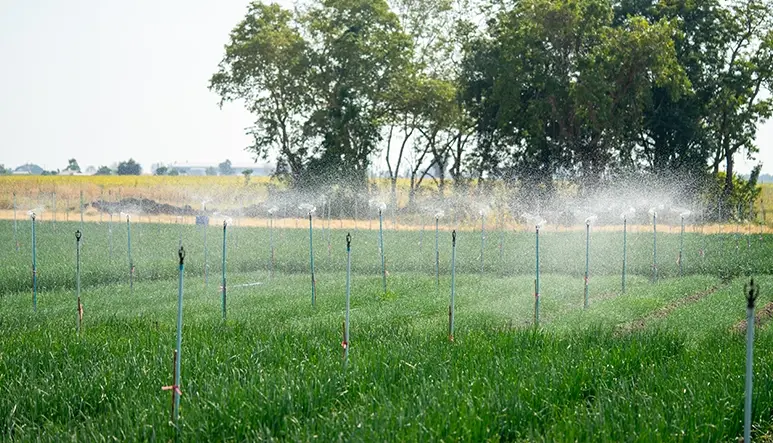The Future of Rice Farming: Innovations and Trends

June 19th, 2023
Rice farming is a crucial industry that feeds millions of people around the world. As we look to the future, there is a growing need for sustainable rice farming practices that can ensure a steady supply of this essential crop while minimising its impact on the environment. With this in mind, many rice farming experts and organisations are exploring innovative new techniques and technologies to optimize production and reduce waste. In this article, we'll explore the latest trends and innovations in rice farming, including the use of organic farming practices, precision agriculture, and genetic engineering. We'll also examine how these practices can help farmers increase yields, reduce costs, and improve the quality of rice crops, while also preserving the health of our planet. Sustainable rice farming practices are becoming increasingly important for several reasons. Here are some key points: Rice farming can have significant environmental impacts, including soil erosion, water pollution, and greenhouse gas emissions. Sustainable rice farming practices aim to minimize these impacts by promoting soil health, water conservation, and biodiversity. Rice is a staple food for billions of people around the world, and its production must be sustained to ensure global food security. Sustainable rice farming practices can help ensure a steady supply of rice while also preserving the natural resources on which it depends. Climate change is affecting rice farming in many regions, leading to increased drought, flooding, and other weather-related stresses. Sustainable rice farming practices can help farmers adapt to these changes by promoting more resilient crop varieties and optimizing resource use. The use of synthetic inputs such as pesticides and fertilizers can have negative impacts on public health, both through direct exposure and through pollution of water sources. Sustainable rice farming practices promote natural pest control methods and minimize the use of synthetic inputs, reducing these risks. Sustainable rice farming practices can also promote economic sustainability by minimizing input costs and reducing the risk of crop failure. Additionally, sustainable farming practices can help farmers access new markets for organic or sustainably produced rice, generating new sources of income. There is a growing need for sustainable rice farming practices to address environmental concerns, ensure food security, adapt to climate change, promote public health, and achieve economic sustainability. By embracing sustainable farming practices, rice farmers can help ensure a sustainable and equitable food system for all. Out of these concerns, the one that needs our utmost attention is the tremendous impact that these practices have on the environment. Rice farming can have significant environmental impacts, including soil erosion, water pollution, and greenhouse gas emissions. These impacts are driven by a range of factors, including the use of synthetic inputs such as fertilizers and pesticides, the heavy reliance on irrigation, and the conversion of natural ecosystems into rice paddies. In addition, the expansion of rice farming into new areas can lead to deforestation and loss of biodiversity. When it comes to agriculture, there have been many advances that have been adopted over the years. Moreover, our country is considered to have one of the largest agricultural sectors, making the execution of many trends and innovations quite early. Some of these are discussed below. In recent years, there has been a growing trend towards organic rice farming practices. Organic farming avoids the use of synthetic fertilizers, pesticides, and herbicides, and instead relies on natural methods to promote soil health and crop growth. This approach can lead to improved soil quality, enhanced biodiversity, and healthier ecosystems, as well as higher quality and more nutritious rice crops. Precision agriculture uses technologies such as sensors, drones, and satellite imagery to provide farmers with detailed information about their crops and the surrounding environment. This data can be used to optimize irrigation, fertilizer application, and other crop management practices, leading to higher yields and lower costs. Precision agriculture can also help farmers reduce their environmental impact by minimizing waste and improving resource efficiency. Advancements in genetic engineering are opening up new possibilities for rice farming, including the development of rice varieties that are resistant to pests and diseases, tolerate drought and other environmental stressors, and have higher nutritional value. Genetic engineering can also be used to improve the yield and quality of rice crops, as well as to reduce the environmental impact of farming practices. The adoption of organic farming practices, precision agriculture, and genetic engineering in rice farming can offer a range of benefits to farmers and the environment. Precision agriculture and genetic engineering can lead to increased yields by providing farmers with accurate data on crop growth and health, allowing them to make informed decisions about planting, fertilization, and other key factors that impact yield. Additionally, organic farming practices can promote soil health and biodiversity, leading to more resilient crops and higher yields in the long term. The use of precision agriculture can help farmers reduce costs by minimizing waste, optimizing resource use, and reducing the need for manual labour. Organic farming practices can also reduce costs by minimizing the use of expensive synthetic inputs, and by promoting the use of natural pest control methods. Precision agriculture can help farmers monitor and manage crop quality, ensuring that rice crops are harvested at the optimal time and under the best conditions. Genetic engineering can also improve rice quality by introducing traits that enhance taste, nutritional value, and other desirable characteristics. Organic farming practices can help reduce the environmental impact of rice farming by minimizing soil erosion, promoting biodiversity, and reducing the use of synthetic inputs that can harm soil health and water quality. Precision agriculture can also minimize waste and improve resource efficiency, reducing the environmental impact of rice farming. The adoption of these practices can help farmers increase yields, reduce costs, and improve the quality of rice crops, while also preserving the health of our planet. By embracing sustainable farming practices, rice farmers can contribute to a more resilient and equitable food system for all. Sponge is a multi-generational rice production company that strives on providing the absolute best quality for you. We excel in quality because of the many years of experience we have; when paired with the latest technology and unmatched man skills, we promise to deliver to exceed your expectations. To know more, get in touch with our rice experts and witness the best produce that there is.The Future of Rice Farming: Innovations and Trends
The Need for Development in Agriculture
Environmental Concerns:
Food Security:
Climate Change:
Public Health:
Economic Sustainability:
Environmental Hazards Caused By Traditional Farming
Rice Farming Development
Organic Farming Practices:
Precision Agriculture:
Genetic Engineering:
The Benefits of Adapting the Latest Rice Farming Trends
Increased Yields:
Reduced Costs:
Improved Quality:
Environmentally Sustainable:
Sponge - Unmatched Quality Produce Through Generations


